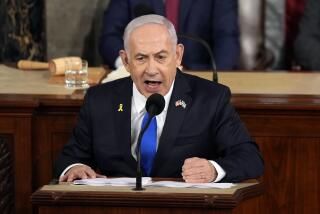Israel Bars New Arms Deals With S. Africa
JERUSALEM — Foreign Minister Shimon Peres, bowing to U.S. demands, said today that Israel will impose limited sanctions on South Africa for the first time by banning new military sales contracts with its white-controlled government.
The decision was made Wednesday night by a 10-member Cabinet forum in anticipation of the April 1 release of a U.S. government report that is expected to list Israel as one of Pretoria’s five top weapons traders.
Israel feared that the report would further strain relations with Washington and lead to pressure for a cutoff in U.S. military aid.
Peres made his announcement in remarks to 65 American Jewish leaders.
“We shall not sign in the future any more contracts in the domain of defense with South Africa and we shall gradually reduce our relations with South Africa,” Peres said.
He refused to elaborate on the sanctions, but government officials said Israel also would curb trade, cultural and scientific contacts with Pretoria and would set up a panel to formulate a new policy toward South Africa within two months.
The measures were backed by Peres and Prime Minister Yitzhak Shamir, while Ariel Sharon of Shamir’s right-wing Likud bloc voted against them, the Israeli media said.
Although new military trade contracts would not be signed, the measures are unlikely to nullify existing contracts, said officials who spoke on condition of anonymity.
Israel has a billion-dollar-a-year arms export business but keeps its trading partners and the size of its arms sales closely guarded secrets. Sources in Jerusalem say Israeli sales to South Africa are mostly light arms.
Foreign newspapers also have reported cooperation between South Africa and Israel on nuclear tests, but Israeli officials deny it.
The U.N. Security Council approved an international embargo on arms sales to South Africa in 1977. Since then, South Africa has expanded its weapons production and is estimated to manufacture about 90% of its own arms needs as well as weapons for exporting.
More to Read
Sign up for Essential California
The most important California stories and recommendations in your inbox every morning.
You may occasionally receive promotional content from the Los Angeles Times.










